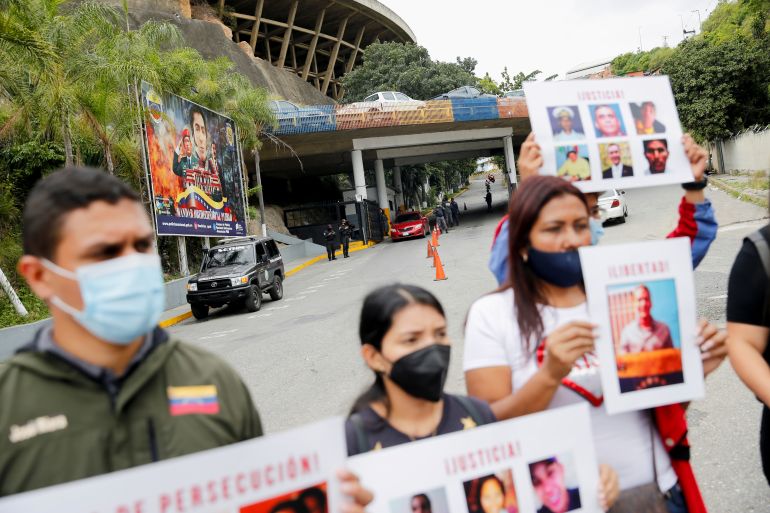ICC to investigate possible crimes against humanity in Venezuela
President Nicolas Maduro says Venezuelan government respects ICC decision to open probe, but ‘we do not share it’.

The International Criminal Court will investigate whether crimes against humanity were committed during Venezuela’s clampdown on anti-government protests in 2017, Venezuelan President Nicolas Maduro and ICC prosecutor Karim Khan have announced.
After a preliminary evaluation, Khan “has decided to move on to the next phase to seek the truth”, Maduro said on Wednesday.
Keep reading
list of 4 itemsIran, Venezuela to sign 20-year cooperation accord
Judge sets arraignment for Venezuelan accused of money laundering
Venezuelan students return to class after COVID-19 closures
“We respect his decision as a state, though we have made clear we do not share it,” he said. “We have signed an agreement that does guarantee, in an effective way, cooperation, positive complementarity, mutual support, constructive dialogue to seek truth and justice.”
For his part, Khan stressed the court’s independence and said its investigations should not be politicised.
“I ask everyone, as we enter this new phase, to give my office space to do its work,” he said.
Jose Miguel Vivanco, executive director of the Americas division at Human Rights Watch, said on Wednesday evening that the “decision – the first in Latin American history – gives hope of justice to the hundreds of victims of brutal repression by the Maduro regime”.
The Prosecutor of the International Criminal Court (ICC) has decided to open an investigation into the situation in Venezuela.
This decision – the first in Latin American history – gives hope of justice to the hundreds of victims of brutal repression by the Maduro regime.
— José Miguel Vivanco (@JMVivancoHRW) November 3, 2021
The ICC has been conducting a preliminary examination into the country since 2018, and Khan’s predecessor Fatou Bensouda said there was a “reasonable basis” to believe the government had committed crimes against humanity.
Maduro complained that the Venezuelan state was not given access to the documents and information evaluated during that phase. “We were blind in that stage,” said the president.
During Khan’s three-day visit to the South American nation, which began on Sunday, small groups of family members of the victims of alleged rights abuses held street protests demanding an audience with Khan.
On Wednesday, there was also a small protest outside the intelligence services headquarters in the capital, Caracas, where opposition figures are being held.
“I’m fully aware of the flaws that exist in Venezuela, the political division. We [the ICC] are not political, we are guided by the principles of legality and the rule of law,” said Khan.
Khan and Maduro signed an agreement to collaborate on the next step of the investigation.

The ICC prosecutor praised the “constructive dialogue” he had following meetings with Maduro, Vice-President Delcy Rodriguez, Attorney General Tarek William Saab and representatives of the Supreme Court.
Venezuelan opposition leader Juan Guaido, meanwhile, welcomed the ICC’s decision, saying it “vindicates the right to obtain justice that has been denied in Venezuela for the victims and their families”.
Earlier this week, Amnesty International’s Venezuela researcher Valentina Ballesta said any further delays by the ICC prosecutor’s office on whether to open the investigation risked putting “victims, survivors, and human rights defenders at greater risk of retaliation”.
“Victims and survivors of human rights violations and human rights defenders have been the ones pushing for international justice remedies that would give the situation in the country the proper attention it requires,” Ballesta wrote.
“However, the current pause on the preliminary examination, as with any other delays, has raised huge concerns over the safety of those who have openly called for an ICC investigation.”
The ICC, which prosecutes war crimes, can only officially step in if a state is unwilling or unable to prosecute relevant crimes in its jurisdiction.